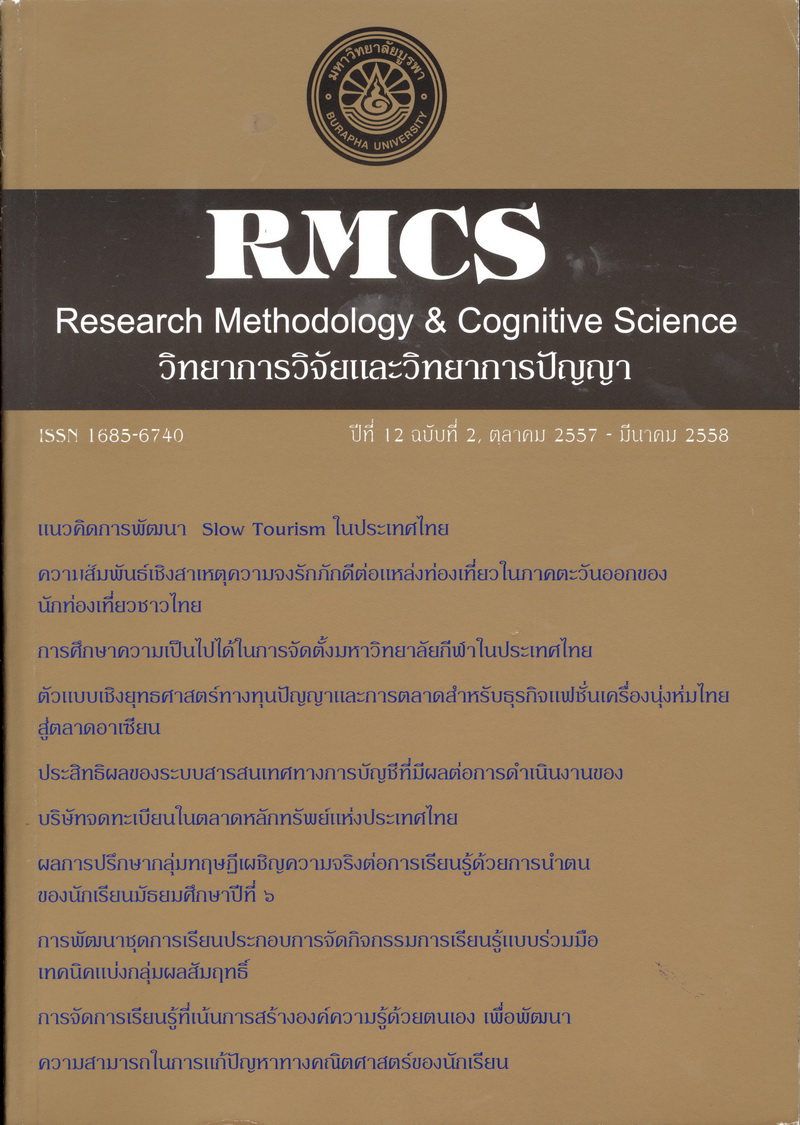ผลการปรึกษากลุ่มทฤษฎีเผชิญความจริงต่อการเรียนรู้ด้วยการนำตนของนักเรียนชั้นมัธยมศึกษาปีที่ ๖
Main Article Content
Abstract
การวิจัยนี้มีวัตถุประสงค์เพื่อศึกษาผลการปรึกษากลุ่มทฤษฎีเผชิญความจริงต่อการเรียนรู้ด้วยการนําตนของนักเรียนชั้นมัธยมศึกษาปีที่ 6 กลุ่มตัวอย่าง ได้แก่ นักเรียนชั้นมัธยมศึกษาปีที่ 6 โรงเรียนอัสสัมชัญศรีราชา ที่มีคะแนนจากแบบวัดการเรียนรู้ด้วยการนําตนต่ํา จํานวน 16 คน แบ่งออกเป็นสองกลุ่มคือ กลุ่มทดลอง 8 คน และกลุ่มควบคุม 8 คน กลุ่มทดลองได้รับการปรึกษากลุ่มทฤษฎีเผชิญความจริงต่อการเรียนรู้ด้วยการนําตน เก็บรวบรวมข้อมูลโดยการวัดผล 3 ระยะ ได้แก่ ระยะก่อนการทดลอง ระยะหลังการทดลอง และระยะติดตามผล วิเคราะห์ข้อมูลด้วยการวิเคราะห์ความแปรปรวนแบบหนึ่งตัวแปรระหว่างกลุ่มและหนึ่งตัวแปรภายในกลุ่ม
ผลการวิจัยปรากฏว่า กลุ่มทดลองมีคะแนนการเรียนรู้ด้วยการนําตน ระยะหลังการทดลอง และระยะติดตามผลสูงกว่ากลุ่มควบคุมอย่างมีนัยสําคัญทางสถิติที่ระดับ .05 และกลุ่มทดลองมีคะแนนการเรียนรู้ด้วยการนําตนระยะหลังการทดลอง และระยะติดตามผลสูงกว่าระยะก่อนการทดลองอย่างมีนัยสําคัญทางสถิติที่ระดับ .05 โดยมีค่าขนาดอิทธิพลอยู่ใน
ระดับมากคือเท่ากับ .96
Effects of Reality Group Counseling on Self-Directed Learning
of Grade Twelve Students
Chanya Pakutai and Warakorn Subwiraprakorn
Faculty of Education, Burapha University, Thailand
The purpose of this research was to study the effects of reality group counseling on self-directed
learning of grade twelve students. The sample used in this study comprised 16 students from Assumption College in Sriracha who had low scores on self-directed learning test. These students were pair matched on their test scores into an experiment and a control group. The experimental group received reality group
counseling on self-directed learning. The data were collected at three moments; pre-test, post-test and follow up. The data were analyzed using a repeated measures analysis of variance comprising one between subjects variable and one within subjects variable.
The results showed that the post-test and follow up test scores for self-directed learning of the students who received reality group counseling were higher than those of the control group (p<.05). Moreover, the self-directed learning scores of the experimental group on the post-test and follow up test were
higher than on the pre-test (p<.05). The effect size was at the high level (ES = .96).

